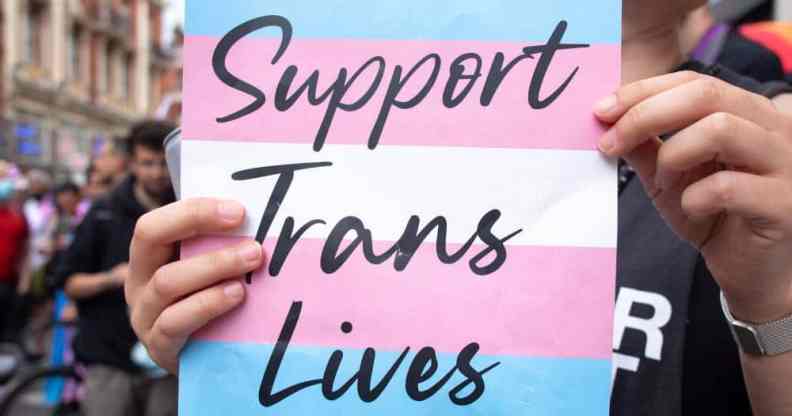‘Exhausting’ reality of life as a trans student living through relentless Republican attacks

A placard that says ‘support trans lives’ printed against the transgender pride flag during a march. (Belinda Jlao/SOPA Images/LightRocket via Getty)
A student in South Dakota has opened up about the “exhausting” and terrifying reality of living through legislative attack after legislative attack on the trans community.
Last month, South Dakota’s Republican governor Kristi Noem signed into law a ban on trans girls and women from competing on female sports teams in the state. It was the first such sports ban to pass in the US this year.
This week, on Wednesday (8 March), the state’s Senate passed House Bill 1012, which the Human Rights Campaign (HRC) has described as a “curriculum censorship bill”. It’s now on its way to Noem’s desk.
The proposed legislation would prevent “divisive concepts” from being taught in South Dakota’s colleges and universities. The definition of these concepts includes “that an individual, by virtue of their race, colour, religion, sex, ethnicity, or national origin is inherently racist, sexist, or oppressive, whether consciously or subconsciously”.
The HRC warned the bill is an “effort to erase and marginalise Indigenous history, LGBTQ+ education and other oppressed voices in and outside of the classroom”.
Vinny Campbell is a trans man and a student at Dakota State University. He told PinkNews he is “tired and angry” that lawmakers keep doggedly introducing anti-trans legislation year after year, despite continued failures to pass them.
“It’s like, this didn’t pass last year, and the year before or the year before that,” Campbell said. “Why are [they] still trying?”
He believes that politicians are “hammering way” with these “upsetting” bills as part of a strategy to win re-election, with primaries set for June and a general election in November.
In January, Noem released an advert that pushed both her trans sports ban and her 2022 re-election campaign.
“They could care less about what happens to the people of their state as long as they make their party happy,” Campbell said.
He finds living through constant attacks on his identity “exhausting”, and is in constant fear of what lawmakers “can take away this time”.
Even university, where he’s secretary for the LGBT+ student group, The Alliance, is “already so draining”.
“You just don’t get to be like a normal college student,” Campbell said. “It just sucks and makes me feel stressed out.”
The waves of bills make him question if he is “safe” in South Dakota, and whether he wants “to stay in the state – or if I want to stay in American in general”.
“But where can I do that’s not a little anti-trans?” he continued.
“The sports bill doesn’t affect me much at all, but there’s going to be other laws they try to pass.
“And it’s like, ‘Wow, am I going to be safe here? When I get older and if I have kids or something, are we doing to be safe here?
“It’s just nerve-wracking. I don’t feel safe. I feel like things can be just taken away from me very easily because I’m trans.”
So far in 2022, South Dakota has introduced four anti-LGBT+ bills, according to Freedom for All Americans. This includes the trans sports ban and the bill prohibiting “divisive concepts” being discussed in higher education.
A separate trans sports ban bill was withdrawn earlier in the legislative session, and a bid to ban trans students from using the correct bathrooms at school was killed in February.
Campbell feels there is a “lot of fear-mongering” in South Dakota around the trans community, with hateful sentiments similar to those pushed about the gay community in the past.
“It’s just really odd because you can tell these people have never talked to a trans person in their life, and they’re never going to go out of their way to talk to us.”
He’s written letters and protested, but “they’re so used to already turning a blind eye [that] it’s just another day for them”. It’s left him feeling powerless, but he draws strength from the communities he has found.
“All the other trans people I know are amazing people, who are the most supportive people I’ve ever met in my life,” Campbell said. “They’re so nice, and if you need anything, they’re 110 per cent willing to help.”
He said the community has “aggressively got each other’s backs” and will help each other out, no matter what.
“We’re always ready to fight.”

